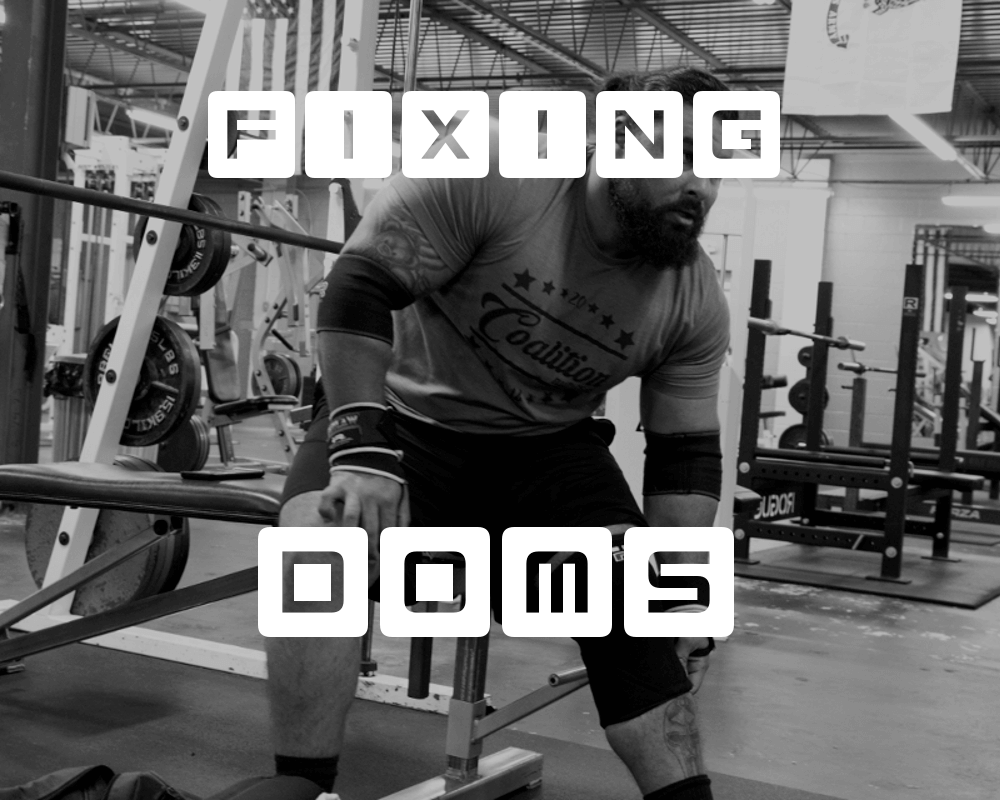Fixing DOMS

Delayed Onset Muscular Soreness is probably the reason 50% of the people reading this article aren't training legs. That abrupt soreness that occurs 36-48hrs after a hard training session can be crippling and if you work in labor, debilitating to your necessary daily functions. DOMS doesn't just come from hitting the big muscles like legs and back, but smaller muscles that may not get utilized as frequently due to changing up your exercises. Almost every time you try something new, you get a little bit of DOMS. This can be especially tough to avoid for those that compete in Crossfit because the exercise variety is so great.
So, want to train legs and actually be able to get out of bed in the morning for the next few days? Here's how:
Stretch Post Workout
There are a lot of benefits to stretching post workout (sometimes even intra). Every time you lift the muscle fibers are broken down and regrown. Over time, your muscles will be come tighter and less flexible. This changes your lifting bio-mechanics and your ability to continue growing as much muscle. While you have to be careful not to overdue the static stretching post workout, it will definitely help reduce your soreness for the days following the workout.
Hydrate
The ultimate form of DOMS is rhabdomyolysis. This is when you dehydrate so much that your muscles start breaking down and your kidneys are negatively affected. Although common in Crossfit, we see it happen with bodybuilders as well. Hydration is much more than just water though. Actually, too much water can dehydrate you! You need to have electrolytes! Sodium, magnesium, potassium in your diet (or supplemented) in conjunction with adequate water intake will aid in hydration. Making sure you are hydrated before and after a workout (especially in the summer) will make a big difference in your recovery. After all, water aids in the transport of nutrients, right?
REM Sleep
We cover sleep quite a bit because of the positive affects it has on your hormones, muscle growth, body fat, gut health and cognition. Well, it will also help your recover better (that's obvious though, right?). Focusing on REM sleep (that deep,deep sleep) is important because that's when your body recovers best. Even if you can't get long hours of sleep every night throughout the week, if you're able to the nights of your most intense training sessions that will be most beneficial.
Food
There are a million ways to diet for training and every person has their own way of doing things. With that said, a caloric surplus can help you recover better. Can't afford a caloric surplus because you're dieting? Aiming the bulk of your carbs around training times can be beneficial for restoring glycogen that gets depleted during the workout.
Blood Flow
You did all of the above and you're still having soreness issues.. what now? Get some blood back in the muscles. You can do this by going for a short walk, very light warm up lifting, air squats, etc. Driving blood and oxygen to the muscles will further aid in the delivery of nutrients and help the muscles repair. If you're really set on recovering better, you'll stretch again after doing this. Foam rolling/massages won't hurt either if that's your style.

